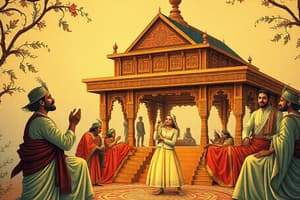Podcast
Questions and Answers
What was the common practice of killing infant girls immediately after birth called?
What was the common practice of killing infant girls immediately after birth called?
Female infanticide
What was the name of the custom of burning a widow alive on her husband's funeral pyre?
What was the name of the custom of burning a widow alive on her husband's funeral pyre?
Sati
Who founded the Brahmo Samaj?
Who founded the Brahmo Samaj?
Rammohun Roy
Which act gradually reduced the practice of female infanticide in India?
Which act gradually reduced the practice of female infanticide in India?
Who took steps to rid the country of thugs in the 19th century?
Who took steps to rid the country of thugs in the 19th century?
Flashcards
Female Infanticide
Female Infanticide
The practice of killing infant girls immediately after birth.
Sati
Sati
The custom of burning a widow alive on her husband's funeral pyre.
Brahmo Samaj
Brahmo Samaj
A religious reform movement in 19th century India.
Rammohun Roy
Rammohun Roy
Founder of the Brahmo Samaj.
Signup and view all the flashcards
Bengal Regulation Act of 1795
Bengal Regulation Act of 1795
An act to reduce female infanticide.
Signup and view all the flashcards
Thugs
Thugs
Members of a criminal gang in India in the 19th century.
Signup and view all the flashcards
Lord Bentinck
Lord Bentinck
British Governor-General who took action against Thugs.
Signup and view all the flashcards
Infant Girls
Infant Girls
Girls who are babies.
Signup and view all the flashcards
19th Century Reforms
19th Century Reforms
Social reforms in India during the 1800s.
Signup and view all the flashcards
Harmful Customs
Harmful Customs
Traditions and practices that are damaging or dangerous.
Signup and view all the flashcardsStudy Notes
Social Reforms in India
- The common practice of killing infant girls immediately after birth was called female infanticide.
Custom of Sati
- Sati was the custom of burning a widow alive on her husband's funeral pyre.
Brahmo Samaj
- The Brahmo Samaj was founded by Raja Ram Mohan Roy.
Female Infanticide Act
- The Female Infanticide Act gradually reduced the practice of female infanticide in India.
Thuggee and Dacoity
- Thugs were rid of in the 19th century by William Sleeman, a British colonial officer.
Studying That Suits You
Use AI to generate personalized quizzes and flashcards to suit your learning preferences.




